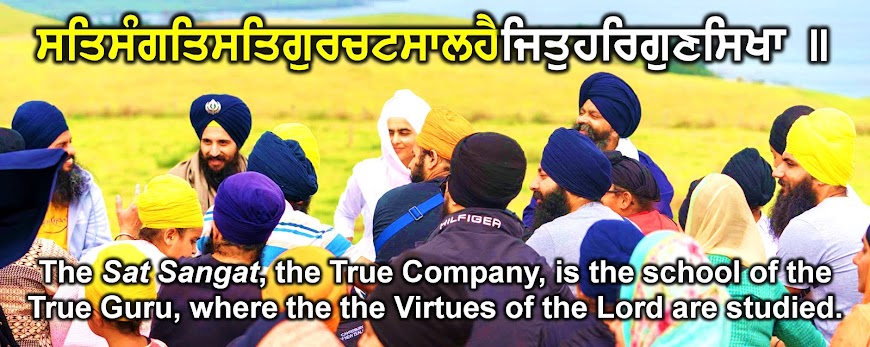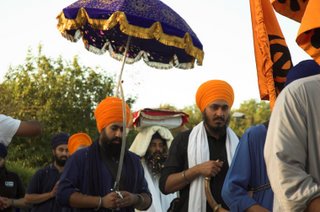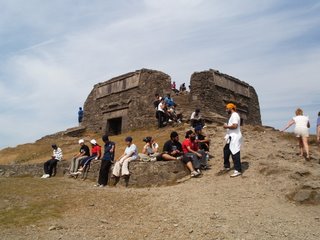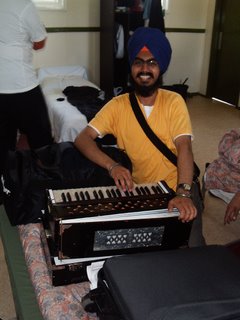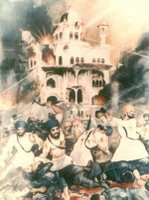On 11th June it was Gurgaddi Divas of the Sixth Guru, Guru Hargobind Sahib jee. Saariaa Nu Lakh Lakh Vadhaayee Hove. On 16th June it is the Shaheedi Diwas (Martyrdom day) of the Fifth Guru, Guru Arjan Sahib jee. May Guru Sahib bless us all.
SHORT GLIMPSE OF THE GURGADDI DIWAS OF GURU HARGOBIND SAHIB JEE

Threat of Sikhi
During Guru Arjan Sahib jee’s time the Sikh Community flourished and Amritsar became a strong centre for the Sikh People. More and more people of all castes embraced the Path of the Guru and became Sikhs, which included Hindus and Muslims. The Muslim priests did not like this and saw the Sikh Guru as a threat to the propagation of Islam. As a consequence of this they made plans against Guru Sahib.
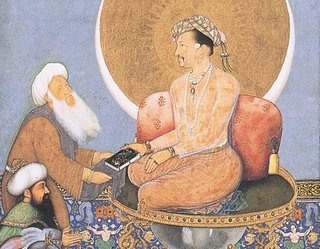
Enemies of the Guru
Unlike his father, Emperor Jaahangeer's policies and views were fanatical and radical in spreading Islam across India. The enemies of Guru Sahib took advantage of this highly charged atmosphere.
Prithi Chand: The elder brother of Guru Arjan Sahib jee had devoted his whole life to harm the Guru in every possible way. He would misinform the Sikh Sangat and divert Sevadaars away from Langar Seva and other Seva attempting to create chaos. He also attempted to poison and kill the Sixth Guru as a child so that his children would be heirs to the Guru's throne.
Chandu Shah: A Brahman adviser and officer of Jaahangeer, he held animosity over his daughter's non-alliance with the Guru Sahib's son. This is considered the main fuel. When he approached the Guru about a Rishtaa (proposal) he used very derogatory and ego filled words with the Guru that implied that the Guru's family were low and should be lucky that they can be joined to a high class family.
Pandits & Maulvis (Hindu & Muslim Priests): The religious leaders of the Hindus and Muslims were jealous at the popularity of Guru Sahib. Furthermore, the Pandits and the Qazis were enraged at the compilation of Aad Granth Sahib (early form of Guru Granth Sahib jee) which criticised the idol worship and rituals of the Hindus, and also the fasting and hypocrisy of the Muslims.

ArrestGuru Arjan Sahib jee was arrested for various charges:
Aiding Khusro: The enemies of the Guru concocted the real story of Guru Arjan Sahib jee sheltering the rebellious Khusro, Jahangeer's son, who had fled a battle with his father and was a fugitive, to rouse the rage of Emperor Jahangeer which added fuel to the blazing fire.
Blasphemy against Islam: The jealous Qazis (Muslim priests) and Brahman Pandits (Hindu priests) were enraged by Hindus and Muslims embracing the Path of Gurmat and abandoning the authorities of the Qazis, Panddits, Vedas and Quran. The Aad Granth Sahib jee (also known as Pothi Sahib) was claimed to be blasphemous because it did not glorify Islam or the Prophet Muhammad and criticised the Qazis.

Guruship passed to the Sixth Guru
While in prison, before his martyrdom at Lahore, Guru Arjan Sahib jee sent a message to his son, Guru Hargobind Sahib jee, then aged only 11, that from today he should maintain an army. Guru Arjan Sahib jee instructed his son to uphold the concept of Miri-Piri (spiritual and worldly authority) and wear two swords, one representing his spiritual leadership and the other his temporal and political leadership.

Torture and Martyrdom of Guru Arjan Sahib jeeOrders were given to torture Guru Sahib to death but in such a way that no blood is spilt because the Mughals feared that the spilt blood of martyrs would create more future martyrs. Chandu was in charge of the torture. Guru Sahib told him: "I bear no enemies or ill-will against any one. All happens as God Almighty wills it to happen. I am prepared to accept His Will. You may do what you like". Guru Sahib was tortured for five days that included starvation, left exposed in the burning heat of the sun, boiled alive in water, red hot sand poured over the body, and made to sit on a red hot iron plate. On the fifth day, according to historian Bhai Kesar Singh Chhibar, Guru Arjan Dev jee was brought outside near the River Raavi and stoned. One stone hit Guru Sahib on his forehead where his eyebrow was, leading Guru Sahib to attain martyrdom. Two drops of blood fell on the floor and the executioners fearing Jahangeer's order not to spill any blood immersed Guru Sahib's body into the River Raavi. Rumours were later made that Guru Sahib wished to bathe in the river and then gave up his own life as a way of taking the blame away from the government and undermining Guru Sahib's martyrdom.

Saint-Warrior Guru
Soon after, Guru Hargobind Sahib jee constructed Sri Akaal Takht Sahib (the Throne of the Immortal) in front of Sri Darbaar Sahib in Amritsar. He raised two flags representing Miri-Piri and instructed the Sikhs: "My rosary shall be my sword-belt and on my turban I shall wear the emblem of royalty (the Kalgi)." Guru Sahib advised every Sikh to keep a sword and maintain a horse, wherever possible. He recruited a regular army and had a personal bodyguard of 57 horsemen and kept 700 horses, 60 gunmen and 500 infantry men. Thus the sovereign Sikh nation that was a state within a state, started and developed by the earlier Gurus, was consolidated by Guru Hargobind Sahib jee.
SummaryBhai Nand Lal Singh jee summarises the personalities of Guru Arjan Sahib jee and Guru Hargobind Sahib jee with the words "Sacrifice" and "Justice". The Shaheedi Diwas of Guru Arjan Sahib jee and the Gurgaddi Diwas of Guru Hargobind Sahib jee shows that the Guru Sahibs taught the Sikhs how to to remain fearless, steadfast and peaceful whilst being tortured defending the Truth, as well as how to raise the sword and take a stand in the world against tyranny to upkeep justice and freedom.
